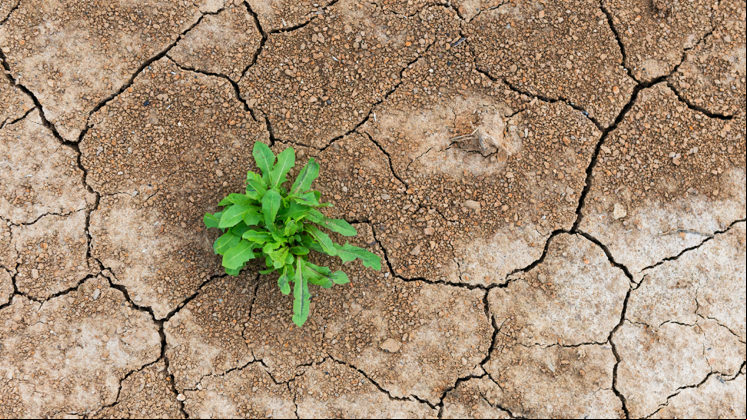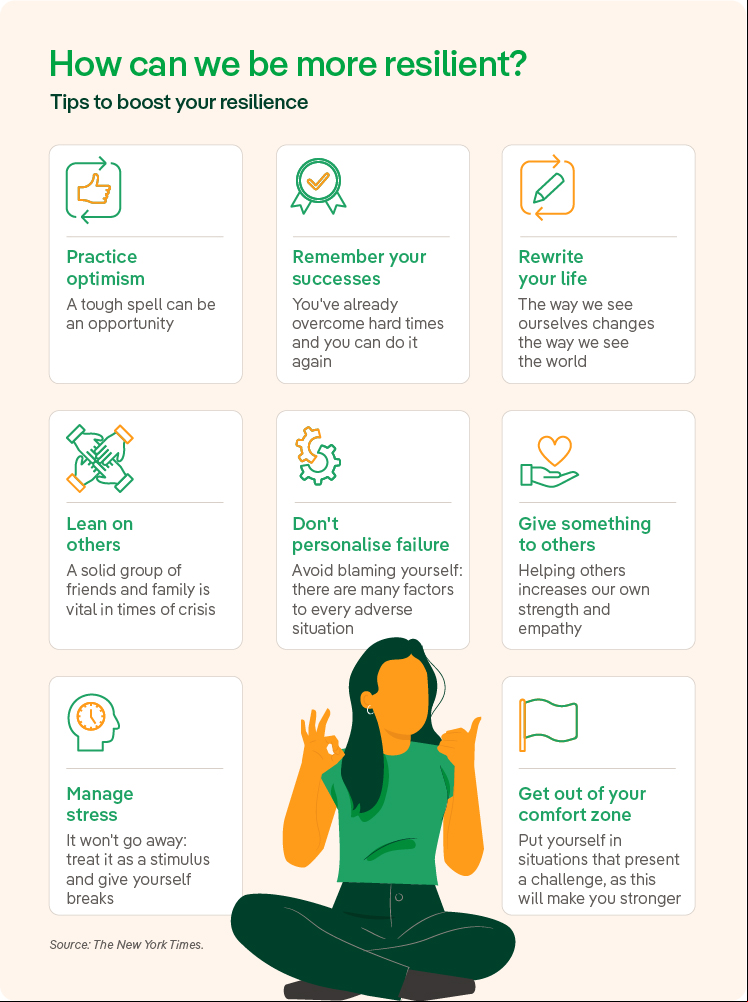Resilience 1we12
Resilience, the key to coming to with the post-coronavirus world 21qp
Society High performance Health
The COVID-19 pandemic has turned our lives and the world as we knew it upside down. If in World War II the British government coined the slogan Keep Calm and Carry On, on this occasion German Chancellor Angela Merkel called on her compatriots to be "resilient" in order to face the health crisis and its economic and social consequences. Here are the keys to understanding the concept and working with it in these turbulent times following the end of the pandemic.

The coronavirus crisis brought with it changes that affect every aspect of our lives. On a personal level we are beginning to appreciate the impact of lockdown, an exceptional situation that has changed our habits radically and introduced us to new ways of ing the time and understanding relationships. On the work front, with the proliferation of teleworking (a trend which in many cases is here to stay), the change has also been considerable. Managing these sudden changes, and doing it well, is one of the greatest challenges that society, on a global scale, has faced since the middle of the last century.
What is resilience? l6171
The health crisis h lasted more than two years and its consequences have been hard both economically and mentally for the population. Managing uncertainty and facing up to adversity — that's where resilience comes into its own. According to the American Psychological Association, "Resilience is the process of adapting well in the face of adversity, trauma, tragedy, threats or significant sources of stress — such as family and relationship problems, serious health problems or workplace and financial stressors. It means bouncing back from difficult experiences". Imagine a tree stoically standing up against the force of the wind. The term comes from the resistance of materials that bend without breaking and return to their original shape.
We owe the spread of the concept of resilience to Boris Cyrulnik, a French neurologist, psychiatrist and psychoanalyst who drew it from the writings of the Englishman John Bowlby, also a psychoanalyst. According to the latter's Attachment Theory, infants who in their early years develop a caring bond with another person will be emotionally stronger despite going through tough experiences, such as crises and war. And, according to Cyrulnik, they are also more resilient, as shown in his famous work The Ugly Ducklings. Resilience: an unhappy childhood does not condition life.
Tips for building resilience 691k6a
Is a resilient person born or made? Adam Grant, professor of Management and Psychology at the University of Pennsylvania and co-author of the book Option B: Facing Adversity, Building Resilience, And Finding Joy together with Sheryl Sandberg, chief operating officer of Facebook, believes in the second: "There is a set of behaviours that can be learned naturally and that contribute to resilience".
Although the current of positive psychology focuses its efforts on how to develop resilience from childhood, there are courses of action that allow adults to boost that capacity to face adversity and emerge stronger. As an adult, the factors that cause stress are multiplied, but experiences from earlier life and the learning acquired by controlling emotions — this is where emotional intelligence comes into play — are the trump cards that can make people more resilient. Here are a few tips to boost your resilience.

Characteristics of a resilient person 6v4i48
Resilience is a dynamic process that encomes many factors: from social (home, the cultural environment, the socio-economic situation) to physical (cognitive, biochemical and physiological). But there is one series of common attributes that is shared by resilient people. Let's take a look at some of them:
Self-awareness and self-confidence 42653
They know their own strengths and weaknesses, which helps them to set goals, identify positive and negative emotions, and, above all, to believe in themselves and improve.
Empathy and sociability 4k1x57
They have the ability to understand and create emotional ties with other people, establishing positive relationships that allow them to be part of healthy emotional networks that they can use for .
Positivity and humour 605q15
A positive approach helps when facing adverse situations, because it focuses on the good side of whatever happens. A sense of humour is a great ally too.
Flexibility 5z2o6r
Despite having a very clear idea of their goals and the perseverance to achieve them, they also possess sufficient flexibility to adapt their plans and adjust targets when necessary.
Tolerance 1d4u5i
They know how to control upsets which in most people produce frustration and doubt in the form of tension or stress.
Creativity 24b3p
They are able to transform a painful experience into something useful or even beautiful.
They live in the present 94q1y
They are used to living in the here and now and they have a great capacity for acceptance. They practice, knowingly or otherwise, a technique like mindfulness.




